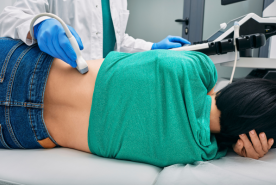Interstitial cystitis (IC) causes bladder pain and frequent urination. It's common in women but can affect anyone. No cure exists, but treatments can help manage symptoms.
What is interstitial cystitis?
Interstitial cystitis (IC) is a disorder in which the bladder (the organ that stores urine before it is passed out of the body) is overly sensitive, and usual causes for this, such as infection, cannot be found. The major symptoms are:
- pain in the pelvic area
- urgent need to urinate often (up to 60 times a day).
The pain can be in the area of the lower abdomen, urethra (tube that carries urine from the bladder outside the body) or vagina. Sexual intercourse may be painful for women who have IC. The symptoms may range from just needing to urinate more often to severe pain and urgency. Work, sexual activity and normal social functioning can become difficult or impossible. The symptoms of IC may stay the same over time or get worse. Some patients may go into remission for extended periods.
What causes interstitial cystitis?
The cause of IC is not known, but it may result from conditions such as:
- allergy
- vascular (blood vessel) disease
- autoimmune disease
- defects in the lining of the bladder wall
- presence of abnormal substances in the urine
- unusual types of infections that are not found with standard tests.
How is the diagnosis made?
The doctor must make sure that other diseases are not causing the symptoms. Similar symptoms may be caused by:
- a bladder infection or urinary tract infection (UTI)
- bladder cancer
- radiation therapy to the pelvic area
- nerve problems
- systemic diseases such as diabetes
- drugs and chemicals that may affect the bladder.
To make the diagnosis, your doctor usually begins with a general examination, including a pelvic exam and urinalysis. The urine is usually normal, with no signs of bacterial infection. For a definite diagnosis of IC, a cystoscopic examination is usually necessary. In this procedure, the patient is put under general anesthesia, the bladder is distended (stretched) with water and the doctor uses a telescopic device (cystoscope) to look inside the bladder. The doctor may also take a biopsy (a small sample of tissue) from your bladder to help exclude other conditions.
Oral Medications
- Elmiron (pertosan polysulfate sodium): This drug received FDA approval in 1996. It is the only oral medication approved specifically for use in IC. It is believed to work by repairing a thin or damaged bladder lining.
- Antidepressants: Tricyclic antidepressants, such as Elavil (amitriptyline) have been shown to help with both the pain and frequent urination of IC. In IC, these medications are used for their pain-relieving properties, not as treatment for depression.
- Other Oral Medications: These include anti-inflammatory drugs, anti-spasmodics, antihistamines and muscle relaxants.
Bladder Instillations
This type of treatment involves stretching the bladder by filling it with water under general anesthesia, as is done in the diagnosis of IC. Certain medications are also used for this such as:
- DMSO (dimethyl sulfoxide): This medication is believed to work as an anti-inflammatory agent which reduces pain. DMSO can be mixed with steroids, heparin, sodium bicarbonate and/or local anesthetics to form a bladder cocktail.
- BCG (Bacille Calmette-Guerin): This is an experimental treatment that is currently in the clinical trial phase and is not yet approved by the FDA. It appears to work by boosting the immune system.
- Cystistat (hyaluronic acid): This medication is also in clinical trials and is not yet approved for use in IC. It is thought to work by replacing the defective lining of the bladder. How well it works is not yet known.
- Other Bladder Instillations: These include heparin or bladder cocktails consisting of several substances combined into one mixture.
Electronic Nerve Stimulations
- TENS (transcutaneous electrical nerve stimulation): The stimulation comes from a device that is worn externally. It helps relieve bladder pain in some people with IC.
- Sacral Nerve Stimulation Implant: This surgically implanted device was recently approved by the FDA for treating a type of urinary incontinence. It is currently undergoing tests for use in IC.
Surgery
For a small minority of patients whose symptoms are severe and who do not respond to other IC treatments, bladder surgery may be considered.
Note: A small number of IC patients have a type of IC caused by painful ulcers on the bladder wall (Hunners ulcer). These can be treated using laser surgery, but this is the only use of lasers recommended for IC patients.
What is the outlook for interstitial cystitis?
IC is a chronic disease. Patients may find some comfort in the fact that it is not life-threatening and it does not lead to cancer. However, because the symptoms are always present, patients need to develop coping skills to deal with them. Support and understanding from family and friends are crucial. For further information, contact the National Kidney Foundation at (800) 622-9010 or info@kidney.org and the Interstitial Cystitis Association (ICA) at (800) HELP ICA or www.ichelp.org .
If you would like more information, please contact us.
© 2015 National Kidney Foundation. All rights reserved. This material does not constitute medical advice. It is intended for informational purposes only. Please consult a physician for specific treatment recommendations.
















